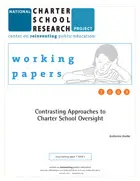Charter school authorizing is an essential component of charter school reform. The past eighteen years have generated lessons about its challenges and best practices. Most agree that laissez-faire authorizing is a recipe for disaster. To ensure quality, authorizers must collect rich data about each school and invest in their own capacity to oversee contracts.
However, authorizers continue to debate just how far they should go to ensure school success. Some advocate a hand’s-on approach, emphasizing the importance of relationships, proactive action and a willingness to offer direct advice to school. Others promote an arm’s-length relationship, suggesting that too-close attention can hinder school autonomy and undermine accountability for results.
While clear-cut in theory, the distinctions between “hand’s-on” and “arm’s-length” are much muddier in practice. Both carry risks and opportunities, and many authorizers have adopted a hybrid approach, combining elements of each philosophy to suit local context and particular needs at different stages in the charter life cycle.




